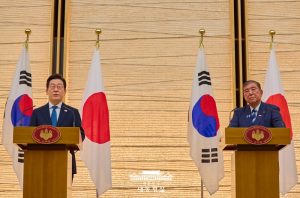South Korean President Lee Jae-myung’s visit to Japan over the weekend marked a significant moment in bilateral relations. Previously labeled by some Japanese media as an “anti-Japan monster,” Lee became the first South Korean leader since 1965 to visit Japan before traveling to the United States. Japanese officials welcomed Lee’s visit, interpreting it as an indication that Seoul is giving higher priority to relations with Tokyo.
Lee and Japanese Prime Minister Ishiba Shigeru issued a joint press statement outlining five key areas of cooperation: 1) enhancing exchanges and strategic communication between leaders; 2) increasing cooperation on future industries; 3) expanding people-to-people exchanges; 4) cooperating on peace and security on the Korean Peninsula and North Korea; and 5) deepening regional and international cooperation.
The statement avoided contentious issues, including historical disputes and South Korea’s restrictions on Japanese seafood imports, and offered only general language and broad agreement on security issues. Still, it was the first of its kind between the two countries’ leaders in 17 years.
Lee’s visit comes at a politically charged moment in Japan. Ishiba faces pressure from right-wing rivals to resign after July’s upper house election loss, which deprived the Liberal Democratic Party (LDP) of its majority in both houses of the Japanese Diet for the first time. The positive evaluation of the visit and Lee’s stop in Tokyo before Washington could enhance perception of Ishiba’s diplomatic skills, an area where he has been criticized to be lacking.
For Seoul, Ishiba is seen as a more moderate partner than other LDP leaders. Notably, Ishiba reinstated the word “remorse” in his address at the 80th National Memorial Ceremony for the War Dead, an annual memorial service marking the end of World War II, for the first time in 13 years, since the LDP returned to power under than-Prime Minister Abe Shinzo.
By comparison, Takaichi Sanae, often described as ultranationalist and historical revisionist, makes regular visits to Yasukuni Shrine, has been photographed alongside a Japanese neo-Nazi, and denies the coercion of wartime “comfort women.” Takaichi was a strong contender in the 2024 LDP party presidential election and would be in pole position to replace him if Ishiba is forced to resign. Domestic rallies in support of Ishiba underscore that many Japanese understand the political risks of a hawkish conservative taking power again.
Beyond the 80th anniversary of the end of World War II, Lee’s visit also coincided with the 60th anniversary of the normalization of Japan-South Korea relations. Lee sent a congratulatory video to a commemorative event at the Japanese embassy in Seoul back in June, while Ishiba and three former Japanese prime ministers – Kishida Fumio, Suga Yoshihide, and Hatoyama Yukio – attended the Tokyo reception. High-ranking Cabinet ministers, rarely seen together at such events, were also in attendance, underscoring the importance of this milestone as an instrument for Korea-Japan reconciliation.
Lee’s own political positioning is complex. He has been criticized for pro-China and anti-Japan, anti-U.S. leanings, even calling Japan an “enemy country” over the release of treated wastewater from the Fukushima nuclear power plant in 2023. Yet he moved toward the political center on his presidential campaign trail, stressing the importance of Japan-South Korea-U.S. trilateral cooperation and stating that he does not oppose Japan’s remilitarization. His security and foreign policy team blends pro-alliance (emphasizing strengthening the South Korea-U.S. alliance) and pro-autonomy (emphasizing reconciliation and cooperation with North Korea) figures such as National Security Advisor Wi Sung-lac, Foreign Minister Cho Hyun, and Director of the National Intelligence Service Lee Jong-seok. This signals Lee’s intention to balance engagement with the United States and Japan, and efforts toward inter-Korean dialogue.
In an interview with Yomiuri Shimbun before his visit, Lee stressed that past agreements on “comfort women” and forced labor will not be rescinded, underlining peaceful resolution over confrontation. He framed these issues as matters of truth and emotion rather than economics, requiring acknowledgment and sincere apology. This stance addresses long-standing sensitivities over the method of compensation. Japan-South Korea relations soured when then-South Korean President Moon Jae-in disbanded the Japan-funded Reconciliation and Healing Foundation, which was established to make reparations to comfort women survivors. The subsequent Yoon Suk-yeol government faced public backlash over its proposal for contributions from South Korean companies to compensate victims of forced labor.
However, Lee’s call for trust and consistency applies to the Japanese side as well, where successive administrations have diluted or backtracked on important statements of remorse and apology for historical atrocities given by Prime Minister Hosokawa Morihiro in 1993, Prime Minister Murayama Tomiichi in 1995, and Chief Cabinet Secretary Kono Yohei in 1995.
Lee’s visit does not eliminate the challenges inherent in Japan-South Korea relations, which have long oscillated between cooperation and tension. But the symbolism of his visit – visiting Tokyo before Washington, the rare joint statement, and the recognition of shared challenges – suggests an attempt to recalibrate the narrative. Japanese media, which once vilified Lee, have noted his emphasis on pragmatic outcomes over ideology.
Regional dynamics also frame this outreach. Rising security concerns, intensifying U.S. demands for troop burden-sharing, and economic uncertainties increase the value of closer coordination within East Asia. For Lee, this visit offered an opportunity to demonstrate that his administration can balance progressive domestic politics with practical foreign policy.

































